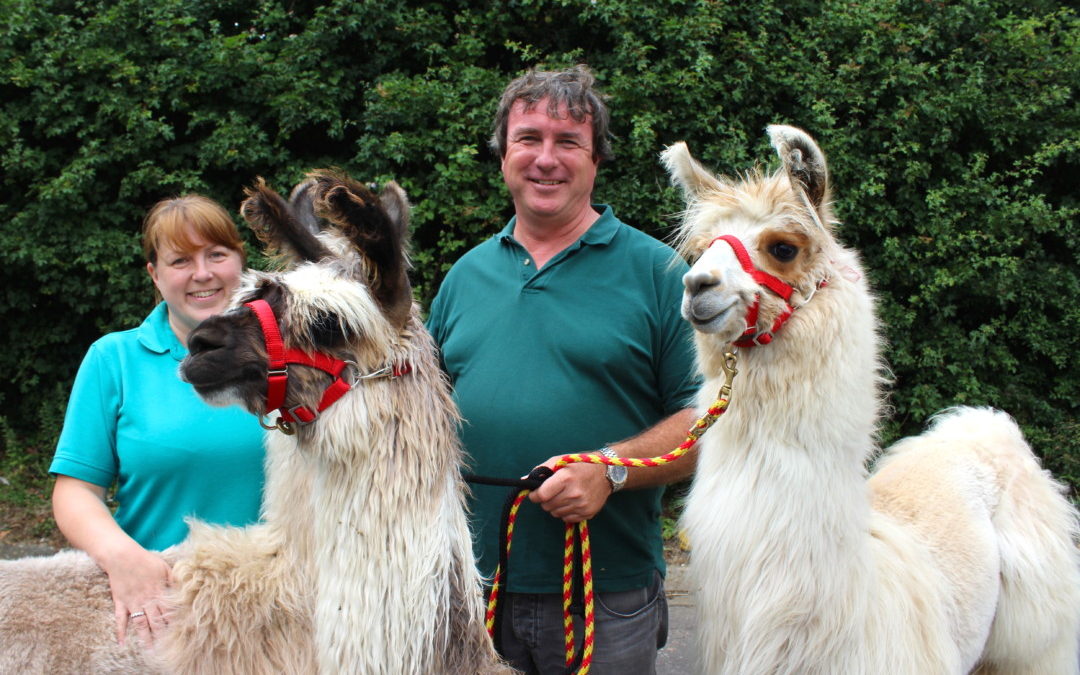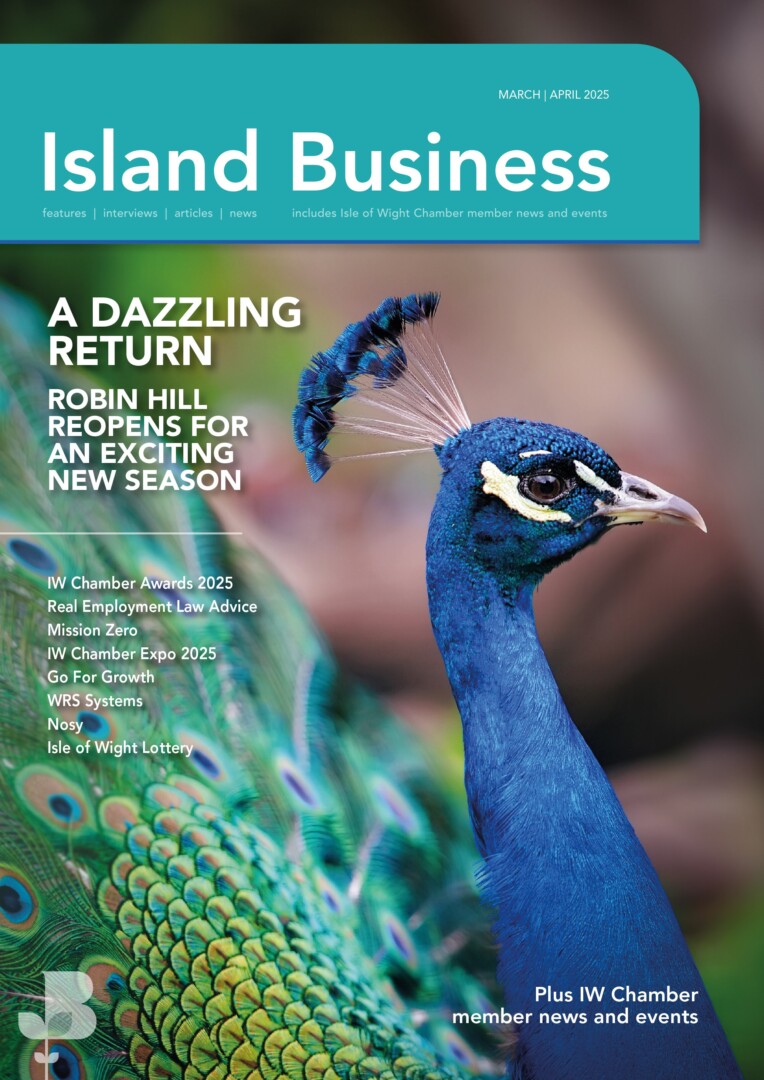Walking with alpacas: how one of the Island’s most distinctive new businesses keeps on growing, with some help from the Isle Of Wight Lottery. By Tom Stroud
Each year hundreds of people go trekking with alpacas from Michelle and Neil Payne’s award winning herd. The husband and wife team run West Wight Alpacas from their base on a 24 acre farm in Wellow, near to Yarmouth. Their business name is descriptive but it’s slightly deceptive too – there’s a lot more going on down on the farm than you might think. There’s a café and a shop, selling products made from alpaca fleeces. There’s also a host of other animals, including llamas and rare breeds. It’s this winning combination of animals, retail and the great outdoors that has made West Wight Alpacas into a very successful business over a relatively short period of time.
“People are completely besotted by alpacas,” explains director Neil Payne. “They come here to see the alpacas and the llamas and then do other things while they are here. Our primary business is breeding high quality Suri alpacas, and while the animal business would work on its own the tourism side makes it much more robust with a regular income stream.”
In 2012 the fledgling business turned over £20,000 which has more than doubled in each year since. Last year Neil and Michelle’s team went out on more than 500 individual walks, taking around 1,500 people on a trek that might last 20 minutes or could go as far as the Tennyson Trail.
“We have people that come over from the mainland just to walk our alpacas,” says Michelle. “One couple from Singapore had even seen us in the Times newspaper and came specifically to see us while they were in the UK.”
The story starts in 2010 with a complete change of career. Michelle sold her business and had the “mad idea” of buying four alpacas for walking with the public. “I nearly fell off my chair,” Neil laughs. “I didn’t even know what an alpaca was!”
Despite any early misgivings, Neil and Michelle quickly built on their plans and became the owners of 11 alpacas. One of the new brood was a stud male; a further seven were pregnant. Nature took its course and within a few years a herd of rare Suri alpacas had been established. Today there are more than 70 Suris, and with breeding season running until November the Payne’s are welcoming new arrivals on a daily basis.
Like their herd, West Wight Alpacas continues to grow substantially, from relatively humble beginnings. For the first couple of years it was “a hobby that had to pay for itself,” Neil says. “I’d heard of llama trekking but never alpaca trekking and I thought the whole thing was a bit of a joke.” Determined to turn the idea into a commercially sustainable business, the Payne’s brought in mainland consultants who quickly pointed out the successes of a similar business in Chichester. Within a week Michelle and Neil had paid them a visit. “They were really helpful and didn’t see us as any competition. They helped us with the risk assessments too,” Neil adds.
With a small business now up and the running, a group of local ladies began taking the alpacas out. With only a little advertising they oversaw around 100 alpaca walks in 2012, on and off the farm. At the same time Neil and Michelle were concentrating on the next stage of their business and one which would prove to be the catalyst for major growth.
“Once we had started the alpaca walking, we quickly realised that people wanted a café,” Michelle explains. “I wanted to convert the pigsty into somewhere that we could serve food for our walkers and our visitors. I went to a Chamber Of Commerce business start-up meeting where I heard about the funding on offer from the IW Lottery. I came home very excited. Neil and I put our business plan together and we went through to the loan panel. It was quite daunting to begin with as we were new to tourism and it was hard to get our head around our new income streams. We came away feeling really positive. When we got the phone call to tell us that we’d been approved we jumped for joy. Knowing that other people had faith in us was fantastic. The Isle of Wight Lottery is great for the island.”
“New starts are very difficult,” Neil agrees. “Michelle was owed part of the sale of her previous business and a large amount of the money was being paid over a four year period. We tried to borrow £20,000 from our bank as a bridging loan, but because we were a start-up, they refused. This made us eligible for the IW Lottery loan and we’re hugely appreciative.”
The Chamber’s loan provided funding of £20,000, interest free, over four years. That loan has now been completely repaid and West Wight Alpacas has gone from employing 3 to 8 people over the same period of time.
“The loan gave us security and enabled us to take on members of staff to help run the business,” Michelle explains. “We went to HTP for apprenticeships. One young team member moved to an apprenticeship after volunteering for a year. Now four apprentices have been through the process here.”
The newly converted café and shop opened in Easter 2013 and provides a “hub” for the business. As well as drinks and snacks there’s merchandise on offer, including items made from yarn from the West Wight Alpaca herd. The Suri fleeces are harder to process but in high demand, particularly in the Italian fashion industry. The fleeces are harvested and sent to a mill in Dorset where they are turned into yarn.
“The shop and cafe really are the centre of the business,” Neil says. “Just doing alpaca walking isn’t enough and we needed to offer a package of things. None of the individual aspects of the business would be successful on their own. We can sell all of our products here, importing alpaca yarn from elsewhere to keep up with demand.”
Michelle and Neil’s success hasn’t just been financial. In March, West Wight Alpacas walked away with a brace of prizes at the British Alpaca Society’s national show. Vivaldi and Vectis, King Of The Isle, were first place winners in their respective categories. Raising champion alpacas has definitely been rewarding although it hasn’t always been straightforward.
“We’re all about breeding the best quality Suri alpacas – but bringing 6 stud males back through quarantine from the States was the most stressful and difficult thing I’ve ever done in my life,” Neil says. “It was worth it though. We now have interest from all over the world and we probably have the best herd of coloured Suri alpacas in Europe. The future is really exciting and it would be nice to think the Isle of Wight was quite proud of our achievement.”
Looking ahead, there’s still a lot to be done. This summer Michelle and Neil have a busy schedule that takes in profile-raising events like the County Show, Bestival and Camp Bestival. They want to bring in more of a restaurant feel to the cafe, including adding a pizza oven. They’re also looking at putting in a play area and even considering adding camels to the animals on offer, subject to planning and licensing.
“It’s very much an accidental business, driven by the public,” Neil says. “We’re still in the expansion stage and we’re ambitious. This is still a new business and every day brings a new challenge. There’s a lot that we want to achieve during the next few years. We’re here to stay!”
First published in the August 2015 issue of Island Business magazine.



